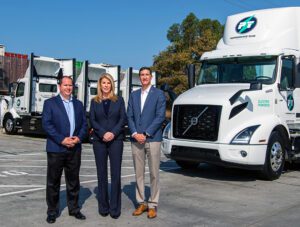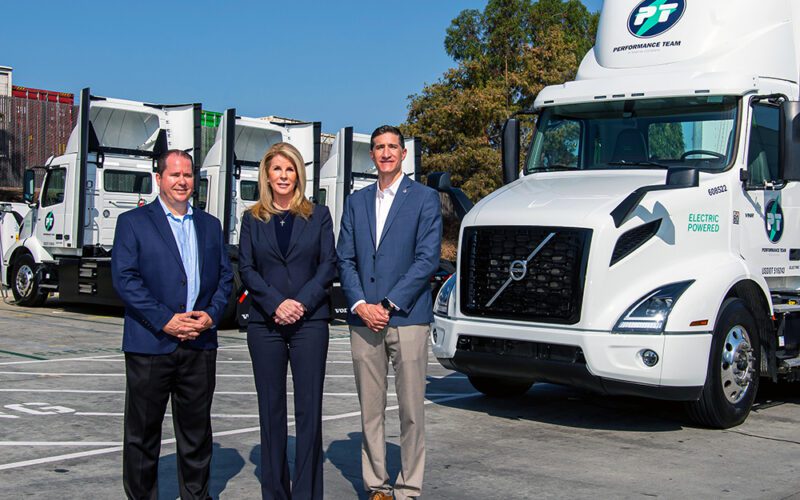
Los Angeles-area logistics company Performance Team has deployed its first Class 8 battery-electric trucks from Volvo Trucks North America in Southern California in response to customer demand for sustainable short-haul warehouse and distribution center operations, the company announced Oct. 6.
The Volvo electric trucks are designed to handle local and regional distribution with a range of up to 275 miles on a single charge, Performance Team said, adding that it expects to deploy 126 Volvo Electric trucks in North America by the third quarter of next year.
“Customers are looking for more tangible, sustainable options in their supply chain to satisfy their long-term climate change goals and their immediate business needs in short-haul trucking. So, we’re working closely with our partners at Volvo Trucks North America and TEC Equipment on electromobility solutions to define a new supply chain eco-chapter in our operations,” Performance Team Executive Vice President of Operations Jason Walker said.
Performance Team said that it worked closely with the sales team at TEC Equipment-Fontana, a Volvo Trucks’ certified electric vehicles dealership, and Volvo Trucks North America, to identify the configurations needed to run their daily freight routes.
In addition, the partners leveraged Volvo Trucks’ Electric Performance Generator (EPG) tool, which simulated Performance Team’s real-world routes to determine which ones were best suited for the Volvo electric trucks, taking into consideration environmental factors such as speed, payload, terrain, and ambient temperature.
The EPG also considers specific route details, including traffic patterns, to determine if an opportunity charge would be required.
“Introducing any new technology into your fleet operations can come with a learning curve, which we are definitely seeing as customers make the switch from diesel to battery-electric trucks,” Jared Ruiz, acting head of electromobility sales for North America with Volvo Trucks North America said.
“It is inspiring to see our very first Volvo Trucks certified EV dealer working side-by-side with the largest Volvo VNR Electric fleet in the world,” he added.
The scaled deployment of zero-tailpipe emission Volvo VNR Electric models is part of the company’s environment, social and governance (ESG) strategy to decarbonize logistics. Its California-based fleet operates 215 trucks, which Performance Team intends to fully transition from diesel to battery-electric trucks.
The 126 Volvo VNR Electric trucks are the first step in that plan, according to Performance Team, as well as creating new charging infrastructure to support its battery-electric fleet.
“Both Volvo Trucks and TEC Equipment continue to go above and beyond to support Performance Team’s growing battery-electric fleet. One example is the ongoing training they are providing to help our drivers optimize the range of the Volvo VNR Electric, including how to leverage regenerative braking benefits to add power back to the battery,” said Michael Gallagher, head of indirect sourcing, North America, at Performance Team. “Overall, our drivers have had a very positive experience with the Volvo VNR electric trucks.
Performance Team, which has been owned by shipping company A.P. Moller–Maersk since 2020, ordered 126 Volvo VNR Electric trucks earlier this year as part of an order of 450 electric trucks to learn more about EV operations and battery technology that support Maersk’s global decarbonization goals.
Maersk has a goal of enterprise-wide, carbon neutral operations by 2040 with significant steps to be taken by 2030. In the state of California, the California Air Resources Board (CARB) has regulations that require diesel trucks to transition to zero emissions by 2030.

